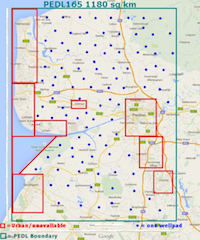Radio 4 – Shale gas’s latest PR recruit?
This morning on Radio 4 I woke up to hear a bizarre item in which Simon Jack gave 3 minutes of air time to an energy company boss who spouted PR unchallenged for the entire piece. He wasn’t seriously questioned and no opposing view was provided for balance
0716 Business news with Simon Jack. The chief executive of the Middle East’s oldest private oil and gas company says that shale gas is “a game changer”. But Crescent Petroleum’s Majid Jafar told Today programme business presenter Simon Jack that the growth of unconventional energy sources highlights the need for a “proper long-term strategic energy policy” rather than one which is “just reactive or politically expedient”.
Mr Jafar trotted out the gas industry’s favourite line that Germany was going back to coal generation, suggesting that it’s commitment to renewables was somehow a shaky failure.
Let’s just look at this claim for a moment shall we?
Germany is the country in Europe that probably has the best claim t having the “proper long-term strategic energy policy” that Mr Jafar says we all need.
Germany’s commitment to renewable is greater than any other European government and it’s success is amply demonstrated by the fact that Germany constantly and consistently breaks records for the amount of power generated from it’s various renewable sources – solar, wind, hydro, bio etc.
If you look at the table at the end of this piece you will see that Germany is streets ahead of the UK in both where it is today and where it will be by 2050.
However, in the real world there is a triangular set of tensions between demand, supply and the potential damage caused by sources of supply.
Everyone knows that if we are to keep up with the apparently insatiable demand for energy which our economies are based on we need to ensure that there is a bridge towards any renewable future. How big that bridge has to be depends on how well demand can be managed, but no Western political party is going to get itself elected by telling its people to turn off their central heating and fridges and put on an extra sweater. Funnily enough Jimmy Carter tried just that in the oil crisis of the 1970’s and nearly got laughed out of town by consumers who felt they have a God given right to the cheap energy they were brought up to believe would always just be there .
It’s just not a way to win an election, but in spite of that Germany’s government has been brave enough to introduce the most ambitious energy-saving program in Europe, aiming for a 30 percent reduction in energy usage by 2020. So – one way to make the size of the bridge needed smaller is to reduce potential demand.
…but we still need a bridge, so what should we build it out of?
Germany has decided it doesn’t want nuclear so it has a binary choice. Coal or Gas. What is significant here is that the decision Germany has made is to keep using “dirty” coal in preference to “clean” shale gas. Why?
Well first of all shale gas is not, as the industry loves to claim, cleaner, and secondly the impact of coal is a known quantity. Coal may be a carbon fuel whose use needs to be controlled but it’s use is not a massive gamble. It does not need communities to take a risk on unproven reserves with potentially devasting effects that would be absolutely irreversible. So what Mr Jafar should be asking is not why Germany is building coal fired power stations but why it is turning it’s back on shale gas. Of course the answer to that might be a little inconvenient!
Maybe the German’s are rather cleverer than Mr Jafar gives them credit for. Instead of a crazy “dash for gas” in the hope of getting some quick and dirty tax revenues, their Government really does have a “proper long-term strategic energy policy”.
We do wish our Government did too!
Germany |
UK |
|
|---|---|---|
| Population (millions) | 82 | 62 |
| Electricity production in 2011 (Twh) | 612 | 317 |
| Individual or community owned renewable energy capacity 2010 (%) | >65% | <10% |
| Renewable electricity 2011 (%) | 20 | 9.5 |
| Nuclear electricity 2011 (%) | 18 | 19 |
| Nuclear phase out date | 2022 | none |
| Installed renewable capacity end 2010 (GW) | 54 | 9 |
| Installed nuclear capacity end 2010 (GW) | 20 | 10 |
| Installed nuclear capacity end 2011 (after Germany phase-out decision) (GW) | 12 | 10 |
| 2020 renewable electricity target (%) | 35 | 30 |
| 2050 renewable electricity target (%) | 80 | none |
| 2050 renewable energy target (%) | 60 | none |
| 2020 greenhouse gas emissions cut target | 40 | 34 |
| 2050 greenhouse gas emissions cut target | 80-95 | >80 |
| Primary energy demand change by 2050 (%) ref 2008 | -50 | -14 to -43 |
| Electricity demand change by 2050 (%) ref 2008 | -25 | +33 to +66 |
| http://www.decc.gov.uk/en/content/cms/news/pn12_032/pn12_032.aspx | ||
| http://www.world-nuclear.org/info/inf43.html | ||
| http://www.world-nuclear.org/info/inf84.html |




























